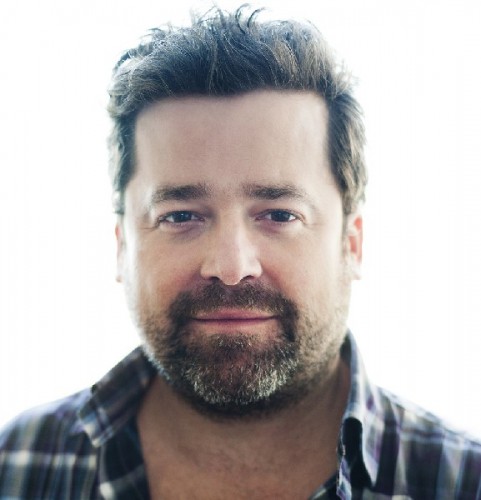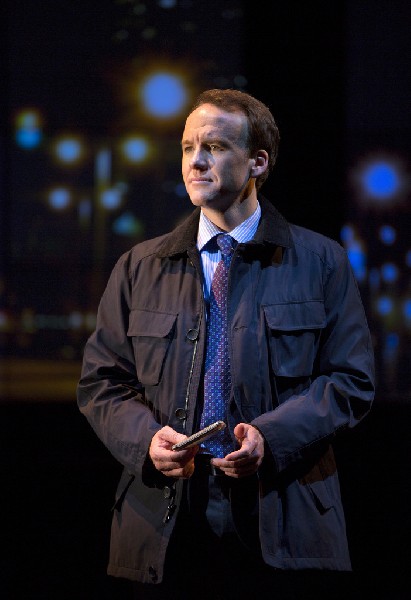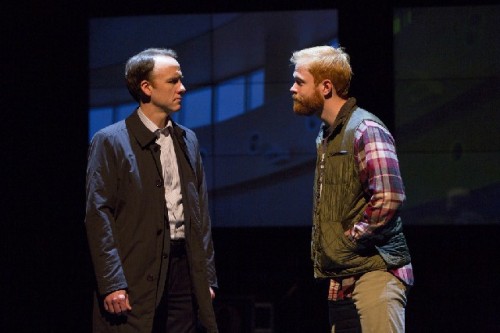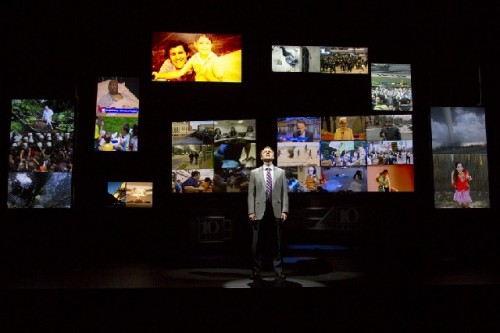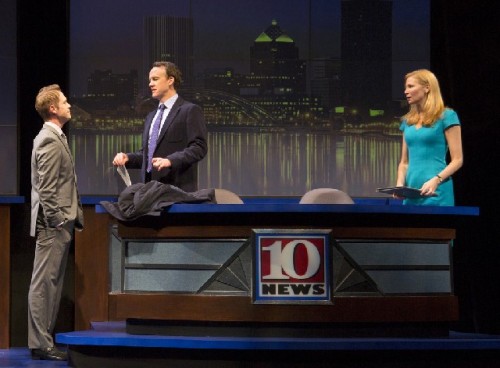The Power of Duff Powerful at Calderwood
Playwright Stephen Belber Brings A New Voice to Theatre
By: Mark Favermann - Oct 24, 2013
The Power of Duff
By Stephen Belber
Directed By Peter DuBois
The Ensemble: David Wilson Barnes as Charles Duff; Ben Cole as Scott Zoellner; Noah Galvin as Ricky; Brendan Griffin as John Ebbs; Russell G. Jones as Joseph Andango; Joe Paulik as Ron Kirkpatrick and others; Amy Pietz as Charlie’s ex-wife Lisa; and Jennifer Westfeldt as Sue Raspell..
Creative Team: Scenic design by David Rockwell; Costume design by BobbyFrederick Tilley II; Lighting design by Rui Rita; Sound design by M.L. Dogg; and Projection design by Aaron Rhyne.
Produced by the Huntington Theatre Company in association with the New York Stage and Film and Vassar’s Powerhouse Theater
At the Calderwood Pavilion at The Boston Center for the Arts, 527 Tremont Street, Boston, MA
October 11 to November 9. 2013
Setting a story in a TV newsroom seems almost a cliché. But in the hands of gifted playwright Stephen Belber, this mass communications environment takes on an atmosphere of human exploration. In Belber's perspective, it is a personally hazardous journey of how mass media affects its subscribers and its practitioners as well as how individuals react and act personally. This drama is superb.
The Power of Duff is a provocative story of the conflict between religion and the secular politically correct society. Where should the line be drawn between dogma and news, faith and factual information? Belber cleverly intertwines the personal family crisis of the protagonist and others with this more cosmic dilemma.
The narrative centers around over the hill local nightly news anchor Charlie Duff. The setting is the Chanel 10 studio, the #3 rated twice nightly newscast (at 6 and 11) in Rochester, NY. Rochester is a Rust Belt City, declining from what it once was, but like Charlie, steadfastly holding on.
Duff does this by reacting to his estranged father's death by ad-libing a personal prayer instead of his usual sign-off "Have a safe and happy night." The spontaneous prayer causes a huge reaction, both of outrage and delight. In the newsroom, his colleagues are confounded, his boss is angered, but the audience seems mesmerized. When Charlie is told to stop, he somehow cannot help himself and continues to make his end of newscast prayers.
Channel 10's news gains audience and are embraced by social media as Duff's prayers get on You-Tube, emails clog the stations computers, thousands of tweets and both for and against Charlie crowds form outside the station. The televised prayers go from a local event to a national discussion to a Worldwide conversation. Duff becomes famous.
Part of the reaction is the shock of Duff not following the expected norm. For the most part, newscasts, public expression and mass media are carefully scripted, rehearsed and predictable. But Charlie Duff has deviated from the norm. And what does that mean?
On a more cosmic level, these rather secular prayers give a sense of meaning and optimism to life. Despite his growing viewing audience and fame, he struggles mightily with his inability to connect with his colleagues, ex-wife and especially his 15 year old son. The uproar about his new found spirituality causes him painful introspection, a self-analysis that he has had little of during his highly egotistic and self-entitled life and often selfish career.
This relationship dilema is the drama's conflict. The playwright's skill shines here expressing through dialogue the various conflicts and contradictions of Duff's life. Though full of wit and laugh-out-loud humor, the play is very serious drama. Belber elegantly speaks to one man's difficult journey while wrestling with his inner demons to discover who he is and what he wants in the context of a voracious world of quick fixes, feel good philosophy and even occasional rare miracles.
The cast is exemplary. Each character is fully realized in their portrayals. David Wilson Barnes as Charles Duff subtly and gracefully expresses the superficiality of the television personality coming to grips with the pain and suffering of real life. Ben Cole energetically encapsulates the amoral opportunistic news director Scott Zoellner to a tee. Noah Galvin as angst-filled, hormonally-challenged teen-aged Ricky frowns upon the world and especially his father.
At times wonderfully chewing the scenery, Brendan Griffin as the profane and at times profound quick tongued manic sportscaster John Ebbs is sensational. Russell G. Jones strongly plays Joseph Andango not as a charicature but as a man of emotional substance.
Joe Paulik as field reporter Ron Kirkpatrick plays the ernest correspondent with unerring forthrightness and awkward humor. Amy Pietz as Charlie’s ex-wife Lisa poignantly suffers most for her child and a bit for herself, while Jennifer Westfeldt as news anchor Sue Raspell is at once elegantly professionally cool as well as sympathetically fragile as Duff's on-air partner.
Director Peter DuBois has verbally, visually and spatially orchestrated a most subtle drama in this dynamic production. His skills have flawlessly interwoven, narrative, characters and sets to beautifully punctuate the wonderful storytelling of playwright Stephen Belber. Here humor is balanced with sadness, emotion is tempered by insensitivity. This is a theatrical treat served up by Director DuBois on a savory platter created by Playwright Belber.
The creative team led by David Rockwell designed an abstractly realistic visual experience. From Bobby Frederick Tilley's costumes to Rui Rita's lighting to M.L. Dogg's sound design, each one of the pieces of the design together has created a vitally enjoyable and compelling plot environment. Aaron Rhyne's projection designs were simply spectacular.
The Power of Duff is a bittersweet story about public and personal transformation and hope. It is a brilliantly conceived and wonderfully performed play using a perspective of mass appeal and acts of individual redemption. This show is a brilliantly provocative theatrical event.


